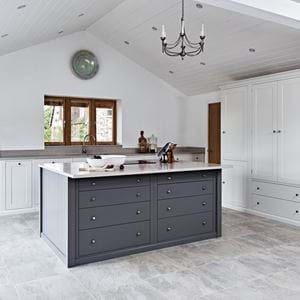A different perspective, part two
A different perspective, part two
A phrase that means a lot to us. A phrase that we think best sums up our ethos and our way of thinking. A phrase that we use as our compass, to guide everything we do.
We believe in a different perspective, from the way we design our products to the way we build our stores. Every few months, either Giles or myself will write a short article for our journal, because we’d love to share our perspective with you. We hope it sheds a little more light on what makes us tick.
Not too long ago, I wrote about how we approach design. I touched on the idea of perfection, and what our own version of that is – how we design things to be lived in and not just looked at, and strike a balance between function and form. This time, I’d like to explore another important aspect to our design approach. One that affects how each of our designs comes into being as well as how they’ll live their lives in your home.
I often say that I’m not interested in how things have been done before. But there’s more to it than that. As a design company, we care very much about heritage and tradition – respecting them both and learning from what’s been done before. And we think that these are things you care about too. We’re interested in what other countries and other companies have achieved too – of course we are. If the old way is best, we won’t change it for the sake of it. Like mortise and tenon joints for example. They’ve been used for more than 7,000 years, for good reason. We trust them completely, and so can you; we use them across our entire collection. They do the job beautifully and they’ll never let you down. My point, really, is that I want us to improve on previous bests. We’ll consider the way something has been done before, but we’ll take that idea apart and look at all of the pieces and if we think there’s a better way of doing things, instead of doing X, we’ll create Y and Z and go with those instead. Sometimes, we’ll even come up with a letter that didn’t previously exist, and we’ll look into patenting it (we currently have four patents pending). And we’ll improve on our own bests too if we can. I want us to value heritage, to introduce innovation to the old, to be courageous with the new, so that what we’re making for your homes is the best that it can possibly be.
Innovative thinking extends to how our designs can be used too. At times, we create a piece that we see as having one very clear use. Just because it’s called a console, doesn’t mean it has to act like one. It could be a potboard in a kitchen, it could even be a writing desk. We encourage people to see them in a different light so that you can enjoy them to their fullest potential. In this scene, you see what looks to be a dresser in a dining room. And I suppose it is really, but it’s a dresser made of two lots of kitchen cabinetry. The bottom half is our widest drawer base and the top is our new Suffolk countertop cabinet with bi-fold doors. Usually, you’d see them as part of a wider run of cabinetry in a kitchen, but we wanted to show how they make as much sense in a completely different room and as an alternative to our freestanding dressers. And that versatility is at the heart of our collections. Put them into a new context. See them in a different perspective.
Giles and I believe in better. The world can be a better place, things can be better than what they are. He’s the maverick out of the two of us, but we both have a real spirit for adventure and I think that does come through in what we do. We aren’t afraid to sail into uncharted waters. In fact, that’s where we set course.
John Sims-Hilditch is the co-founder of Neptune. He’s officially the joint managing director, but when asked what job title he’d give himself, he said ‘director of doing the right thing’. He’s a father of three, the husband of our creative director, Emma, and an avid sailor.






